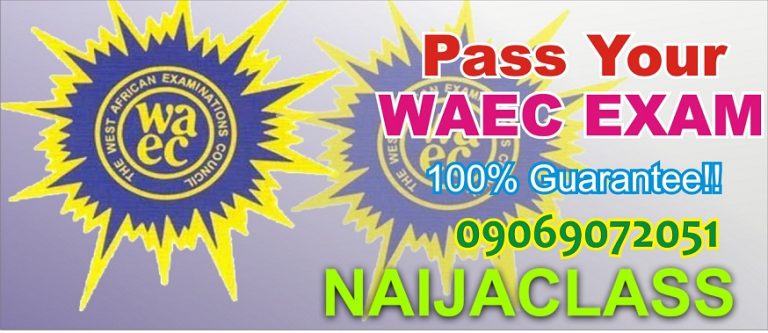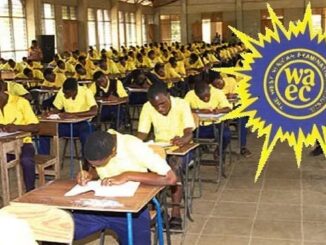Welcome to “Naijaclass Academy“ For Waec 2025 Civic Education Essay And Objective Answer

Wednesday, 14th May 2025
Civic Education 2 (Essay), 9:30am – 11:30am
Civic Education 1 (Objective), 11:30am – 12:30pm
CIVIC EDUCATION
01-10: BDABBABABD
11-20: CBDCCBCADB
21-30: BCCDDCCBAC
31-40: ADDBDBCDBA
41-50: DBDCCACABD
COMPLETED
——————————
WAEC CIVIC EDUCATION THEORY ANSWERS
===================
===================
(1a)
(PICK THREE ONLY)
(i) Promotion of Violence: Constant exposure to violent content in the media can desensitize children, making them more aggressive and undermining parental efforts to teach peace and empathy.
(ii) Encouragement of Immorality: Negative media often glamorizes inappropriate behaviors such as premarital sex, drug use, and disrespect for authority, which conflict with the values parents aim to instill.
(iii) Poor Academic Focus: Excessive media consumption, especially of entertainment with no educational value, can distract children from their studies and diminish their academic performance.
(iv) Distortion of Reality: Media can create unrealistic expectations about life, success, and appearance, making it hard for parents to guide their children to appreciate genuine values and self-worth.
(v) Weakened Parent-Child Bond: When children spend more time consuming media than engaging with family, it reduces quality time and weakens communication and trust between parents and children.
(vi) Reduced Moral Sensitivity: Negative media often downplays the consequences of bad behavior, which can cause children to adopt a careless attitude toward moral and ethical decisions.
(1b)
(PICK THREE ONLY)
(i) Media Literacy Education: Parents should teach children to critically analyze media messages and recognize biases, stereotypes, and falsehoods. This helps children not to accept everything they see or hear as the truth.
(ii) Setting Media Boundaries: Establishing limits on screen time and monitoring what children watch or read helps to control their exposure to harmful content.
(iii) Encouraging Open Communication: Creating an environment where children feel safe to discuss what they encounter in the media allows parents to correct misconceptions and reinforce family values.
(iv) Providing Positive Alternatives: Introducing children to educational programs, wholesome books, and engaging family activities can reduce their attraction to negative media content.
(v) Being a Role Model: Parents must lead by example by consuming responsible media themselves and demonstrating critical thinking, respectful behavior, and good morals.
(vi) Using Parental Control Tools: Installing software or using features on TVs and devices to block or filter inappropriate content can protect children from harmful media exposure.
===================
===================
(2a)
(PICK FIVE ONLY)
(i) Legal Entry and Residence: The alien must have entered the country legally and maintained a lawful residence for a specified period, as required by the country’s immigration laws.
(ii) Good Character: The applicant must demonstrate good moral character by having no criminal record or history of involvement in activities that threaten public peace or national security.
(iii) Proficiency in Language: Many countries require the applicant to have a working knowledge of the official language to ensure proper integration into society.
(iv) Understanding of National Culture and Laws: The alien must show knowledge of the country’s history, customs, values, constitution, and legal system.
(v) Oath of Allegiance: The individual must be willing to take an oath of allegiance, pledging loyalty to the new country and renouncing allegiance to other nations.
(vi) Financial Stability: The applicant must prove that they are financially self-sufficient and will not become a burden to the state.
(vii) Contribution to Society: Some countries require evidence that the applicant has contributed positively to society, such as through employment, community service, or investment.
(viii) Age Requirement: The alien must have attained the legal age of maturity, often 18 years or older, as required by the naturalization laws of the country.
(2b)
(PICK FIVE ONLY)
(i) Respecting National Symbols: Citizens can show loyalty by respecting national symbols like the flag, anthem, and coat of arms during official events and daily life.
(ii) Obeying Laws and Regulations: Abiding by the rules and laws of the country shows commitment to social order and national unity.
(iii) Voting in Elections: Participating in free and fair elections helps in choosing competent leaders and supporting democratic governance.
(iv) Paying Taxes: Timely payment of taxes supports national development and demonstrates commitment to the country’s economic growth.
(v) Defending the Nation: Citizens may serve in the military or support national defense efforts to protect the country’s sovereignty and integrity.
(vi) Promoting National Unity: Avoiding hate speech, tribalism, and discrimination while promoting peace and inclusion demonstrates loyalty to the nation’s values.
(vii) Protecting Public Property: Taking care of and avoiding the destruction of government facilities such as schools, roads, and hospitals shows regard for national assets.
(viii) Reporting Crimes and Threats: Alerting authorities about criminal activities or threats to national security helps protect the nation and its citizens.
===================
===================
(3a)
(PICK THREE ONLY)
(i) Underage Driving: Timmy, being only fifteen years old, is legally underage and not permitted to drive, highlighting a serious violation of traffic regulations regarding the minimum driving age.
(ii) Use of Mobile Phone While Driving: Receiving a call while driving is a distraction and a major cause of road accidents, as it reduces focus and reaction time.
(iii) Disregard for Traffic Signals: Running a red light is a direct breach of traffic laws and endangers all road users by increasing the risk of collision.
(iv) Lack of Supervision: The incident implies that Timmy might have had access to a vehicle without proper adult supervision, which is both irresponsible and unsafe.
(v) Poor Road Safety Awareness: Timmy’s behavior suggests a lack of understanding or disregard for basic road safety principles, which should be emphasized through proper education.
(vi) Negligence in Law Enforcement: The fact that a minor was driving without immediate consequences may indicate weak enforcement of traffic laws and regulations.
(3b)
(PICK THREE ONLY)
(i) Strict Enforcement of Age Restrictions: Authorities must strictly enforce laws that set the minimum legal age for driving to prevent underage individuals from operating vehicles.
(ii) Public Awareness Campaigns: Continuous education through media and schools on the dangers of distracted driving and running red lights can help instill safe habits.
(iii) Parental Responsibility and Monitoring: Parents should ensure that their children do not have unauthorized access to vehicles and must educate them on road safety.
(iv) Installation of Surveillance Cameras: Traffic light cameras and road surveillance can help detect and penalize violators, discouraging dangerous behavior like running red lights.
(v) Integration of Road Safety in School Curricula: Educating students about road safety from a young age can help build a culture of responsible driving before they are old enough to drive.
(vi) Penalizing Mobile Phone Use While Driving: There should be clear penalties for the use of phones while driving, and awareness about these laws should be emphasized to all road users.
===================
===================
(4)
(PICK FIVE ONLY)
(i) Youth Empowerment and Skills Acquisition Programmes (YESAP): This initiative provides training in vocational and technical skills such as tailoring, carpentry, ICT, and welding. Through these programs, many young people gain practical skills that enable them to start their own businesses or secure employment, reducing youth unemployment.
(ii) National Youth Service Corps (NYSC): The NYSC programme encourages national integration and allows fresh graduates to contribute to community development. It also exposes them to leadership roles and job opportunities in different regions, building their confidence and experience.
(iii) Youth Enterprise with Innovation in Nigeria (YouWiN!): This initiative provides financial support and business mentorship to young entrepreneurs. It has empowered many youths by helping them develop business plans, access funding, and grow their enterprises, thus fostering entrepreneurship.
(iv) Government Agricultural Empowerment Schemes: Programs like the Youth Farm Lab and N-Power Agro offer agricultural training, tools, and grants to young farmers. This has encouraged youth involvement in agriculture, helping them become self-reliant while contributing to national food security.
(v) N-Power Programme: N-Power is a large-scale government employment initiative that engages thousands of unemployed graduates in sectors such as education, health, and technology. It provides monthly stipends, work experience, and on-the-job training, empowering participants to be productive members of society.
(vi) Digital Literacy and Innovation Hubs: Governments have established ICT and innovation hubs where young people can learn coding, robotics, digital marketing, and other tech skills. These centers equip youths for the digital economy and open up global job opportunities.
(vii) Student Loan and Scholarship Schemes: By offering scholarships, bursaries, and student loans, the government has made education more accessible to youths from low-income families. This has empowered them intellectually and created a path toward professional careers.
(viii) Youth Involvement in Governance Initiatives: Through appointments, youth parliaments, and advisory councils, the government involves young people in decision-making processes. This not only builds leadership skills but also gives youths a voice in shaping national policies that affect their future.
===================
===================
(5a)
(i)Health Risks: Unknown side effects, potential overdose, or adverse reactions with other medications.
(ii)Legal Consequences: Possession or use of illegal substances can lead to legal troubles, fines, or even imprisonment.
(iii)Impaired Judgment: The pills could impair Mosi’s judgment, leading to poor decision-making that might affect his relationships, academic performance, or safety.
(iv)Addiction or Dependency: There’s a risk of developing a dependency on the substance, which could lead to long-term health and personal issues.
(v)Negative Impact on Academic Performance: Substance use can affect concentration, memory, and overall academic achievement, potentially jeopardizing Mosi’s future opportunities.
(5b)
(i)Say No Directly: Clearly and firmly decline the offer without hesitation.
(ii)Explain His Reasons: Share his concerns about the potential risks and consequences of taking the pills.
(iii)Suggest Alternatives: Propose alternative ways to relax and enjoy time with friends that don’t involve substance use.
(iv)Seek Support: Talk to a trusted friend, family member, or counselor about the situation for guidance and support.
(v)Focus on Personal Goals: Remind himself of his personal goals and priorities, and how substance use could hinder achieving them.
===================
===================
(6a)
(PICK ANY SEVEN)
(i) Lack of Legal Protection: Refugees often lack proper documentation, making them vulnerable to exploitation.
(ii) Separation from Family: Being alone or separated from support systems increases vulnerability.
(iii) Poverty and Desperation: Limited access to food, shelter, and resources may make her more likely to accept risky offers.
(iv) Lack of Education and Awareness: Displaced individuals may not know how to identify or avoid trafficking schemes.
(v) Unregulated Refugee Camps: Poorly managed camps can be targeted by traffickers.
(vi) Limited Law Enforcement Presence: Weak security allows traffickers to operate freely.
(vii) Language Barriers: Difficulty communicating can prevent her from seeking help or understanding dangers.
(viii) Trusting Strangers: Refugees may be easily deceived by traffickers posing as helpers.
(ix) Lack of Employment Opportunities: Desperation for income may lead her to accept exploitative work.
(x) Gender-Based Vulnerability: Women and girls are particularly targeted for sex trafficking and forced labor.
(6b)
(PICK ANY FOUR)
(i) Increase Security in Refugee Camps: Deploy trained personnel to monitor and prevent trafficking activities.
(ii) Conduct Awareness Campaigns: Educate refugees on the dangers and signs of trafficking.
(iii) Provide Legal Documentation: Issue IDs or temporary permits to give refugees legal protection.
(iv) Offer Psychological and Social Support: Help displaced persons rebuild their confidence and decision-making skills.
(v) Ensure Access to Education and Skills Training: Empower refugees with knowledge and practical skills.
(vi) Strengthen Border and Camp Monitoring Systems: Prevent traffickers from infiltrating refugee areas.
(vii) Collaborate with NGOs and International Agencies: Share information and resources to protect vulnerable groups.
(viii) Create Safe Reporting Channels: Establish hotlines and complaint desks for victims to report suspicious activities.
===================
===================
(7a)
(PICK ANY FIVE)
(i) Provision of basic social services such as health centers, water supply, and waste disposal.
(ii) Construction and maintenance of roads within the local area.
(iii) Establishment and regulation of markets and motor parks.
(iv) Collection of rates and levies (e.g., shop and tenement rates).
(v) Registration of births, deaths, and marriages.
(vi) Maintenance of law and order through local security and vigilante groups.
(vii) Development of agriculture and natural resources at the grassroots level.
(viii) Implementation of community development projects in collaboration with local residents.
(7b)
(PICK ANY FIVE)
(i) Federal government allocation (statutory allocation).
(ii) State government grants or subventions.
(iii) Local taxes and rates (e.g., tenement rates, radio/TV license fees).
(iv) Fines and court fees collected from customary courts.
(v) Fees from motor parks, markets, and business premises.
(vi) Proceeds from licenses (e.g., bicycle, wheelbarrow, hawking).
(vii) Rents from local government properties.
(viii) Donations and aids from NGOs, individuals, or international bodies.
===================
===================
(8)
(PICK ANY FIVE)
(i) Ensures Equality Before the Law: Everyone, including leaders, is subject to the law, which prevents misuse of power.
(ii) Promotes Accountability: Government officials can be held accountable for unlawful actions, discouraging authoritarian behavior.
(iii) Protects Fundamental Rights: Citizens’ rights and freedoms are safeguarded, reducing the chance of oppression.
(iv) Limits Abuse of Power: Clear legal frameworks and enforcement mechanisms prevent leaders from acting beyond their powers.
(v) Encourages Judicial Independence: An independent judiciary checks the excesses of the executive and legislature.
(vi) Strengthens Democratic Institutions: It empowers institutions like the legislature, courts, and media to operate freely and fairly.
(vii) Promotes Transparency: The rule of law requires that government actions follow established legal procedures, limiting secrecy and corruption.
(viii) Fosters Public Confidence: When people trust that the law is fairly applied, they are more likely to resist undemocratic rule and support legal processes.
===================
===================
WAEC CIVIC EDUCATION
NUMBER NINE
(9a)
Traditional mode of popular participation refers to the indigenous and informal methods through which people in a community engage in political and societal decision-making processes. These methods are rooted in customs, culture, and long-established practices, such as town hall meetings, age grades, village assemblies, and council of elders.
(9b)
(PICK ANY SIX)
(i) Cultural Relevance: It reflects and respects the traditions and values of the people, making participation more meaningful.
(ii) Inclusiveness: It allows for the involvement of a wide range of community members, including elders, women, and youths.
(iii) Conflict Resolution: Traditional methods often promote peaceful dialogue and consensus-building.
(iv) Trust and Legitimacy: Decisions made through traditional means are often trusted and accepted by community members.
(v) Cost Effectiveness: These systems are usually low-cost since they do not require formal structures or large financial resources.
(vi) Social Cohesion: Participation fosters unity and strengthens the sense of belonging within the community.
(vii) Accessibility: Most people can easily participate since it does not require formal education or technical knowledge.
(viii) Support for Governance: Traditional participation can complement modern governance by enhancing grassroots involvement.
How to get 2025 WAEC Questions and Answers before the exam?
==================
It is important to note that Naijaclass.com is the only website that has the above listed 2025 Waec Expo Daily Subscription Package. However, any website who copy any of the packages listed above will be reported for content theft and have their site removed from Google and other search engines.
==================





Weac 2025 Agric obj and theory questions and answers
I need civic education answer
PLEASE I NEED CIVIC EDUCATION WAEC QUESTION
I need civic essay and objective pleeeease
Pls i need civic education question 2025
Read on community service, benefits of community service, 3 road user
Pls I need civic education waec objectives and theory for today
Please I need civic education essay and objectives
Hi good morning
Hi
Thanks u’ve done a great job
nice